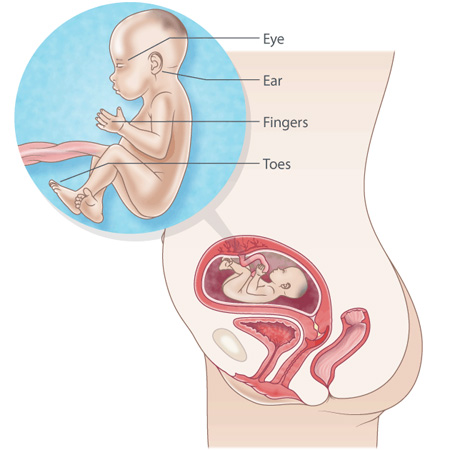You at 20 weeks pregnant
This is the halfway point of the average pregnancy.
Your uterus is taking up a lot more room, and some of your other organs – for example, your heart and lungs – now have less space. You might feel a bit breathless at times, especially when you’re lying flat on your back. It can help to lie on your side instead.
When you’re lying down at night, you might need to put a pillow on one or both sides or even between your legs. You might find this helps ease the feeling of aching hips.

Ultrasound scan at 18-20 weeks
You might have an ultrasound scan this week to check that your baby is growing healthily and to check the position of your placenta. This detailed ultrasound is one of the routine tests in pregnancy.
Vaccination against whooping cough
Whooping cough is a very contagious and dangerous condition for babies. To help protect your baby against whooping cough, it’s recommended that you have a whooping cough vaccination between 20 and 32 weeks of pregnancy. In Australia, this vaccination is free for all pregnant women. Your midwife or doctor can organise it for you.
It’s a good idea to speak with your midwife, doctor or immunisation provider about recommended vaccinations during pregnancy.
Complex pregnancy
If you have a medical problem – for example, diabetes or high blood pressure – or your baby has a medical problem, you’re considered to have a complex pregnancy. This means you’re likely to need to see your health professionals more often and have more checks during pregnancy. Depending on the medical problem, you might also need to see some specialists.
Your baby when you’re 20 weeks pregnant
Your baby is busy and active:
- Your baby measures about 16 cm from head to bottom and weighs about 320 g.
- The heart is beating at 120-160 beats per minute.
- Muscles are growing, and your baby is moving around a lot.
- Your baby’s fingerprints are formed.
- Permanent teeth have grown beneath your baby’s first teeth, deep in the gums.
It’s a good idea to start booking antenatal classes. These classes give detailed information to help you and your partner get ready for pregnancy, labour, birth, breastfeeding and early parenting. Classes can fill up quickly, so ask your doctor or midwife about making a booking early.